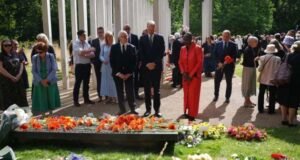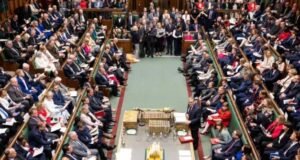 By A Shahid
By A Shahid
7th March should become an official National day and declared a public holiday in Bangladesh says a new initiative, which is spearheaded by a social research company, based in Bow Tower Hamlets.
Agroni Social research is currently working on a groundbreaking socio educational study focusing on the significance of the famous speech given by Sheikh Mujibur Rahman on 7th March 1971 at Ramna racecourse, Dhaka.
The speech delivered to a crowd of over two million east Pakistanis led to his arrest and imprisonment. Just 19 short days later East Pakistan was plunged into a nine-month long liberation war, fought mainly by the guerrilla force Mukti Bahini or freedom fighter with support from India, for independence against West Pakistani regime culminating in the formation of Bangladesh as an independent new nation on 16 December 1971.
Noor Uddin Ahmed Director of Agroni said that as well requesting the Bangladesh Government to declare 7th March a National day and public holiday it will lobby individuals and progressive, social and cultural organisations to make this a reality for the 135 million Bangladeshis including a Diaspora population of approximately 9 million with a UK population of about 500.000.
The speech given by Sheikh Mujibur Rahman aka Bangabandhu lasts approx 19 minutes and contains about 1100. Some parts of the speech appear to have entered every Bengali person’s vocabulary. Common refrains such as “joi Bangla” or “aibarer shongram shadinothar shongram”and “rokto jokon diyeche aro debo” and other variants are widely quoted. Black and white grainy photos from the event is ubiquitous and with other similar images have gone onto claim a cherished place in the hearts and minds of millions of Bangladeshis. His attire particularly the black tunic he wore is famous in its own right throughout Bangladesh and termed as the ‘Mujib coat’. For many Bengalis the Bangabandhu has reached beyond politics and into the realm of popular culture and those iconic words and images are with most Bengalis whether living in UK, Europe, America or any other part of the world. Not a single part of the speech is taught in a school or madrasha curriculum yet it is learnt automatically without any conscious attempt or effort; it features frequently in common parlance and has easily become part of the glossary of Bengali language. From high-ranking politicians, lawyers, teachers, doctors to the postal worker or police constable, the country dwelling boatman or the city rickshaw puller, young and old all it seems know and quote readily this landmark political speech that led to create a new nation. It is no exaggeration or far off the mark to suggest it is probably one of the most common Bengali phrases amongst ‘asalam ailaikum’, ‘ami bangali’, ‘sonar bangla’ or ‘kemon achen’ by way of a possible list.
“The speech changed the course of history and changed the map of the world. There is no doubt 16 December would remain an unaccomplished desire without it,” says Mr Ahmed who is also the project leader for 7th March Foundation. Speaking enthusiastically and eloquently he went on to say: “Bangabandhu Sheikh Mujibur Rahman was a world figure and created a new nation, more people across the world, particularly young people need to know this’ and that’s the main reason we will publish our conclusions in English on our new website 7thmarch.com.” Speaking at the official launch event for Agroni’s new website, Mr Ahmed, a dedicated long standing community activist said : “Bengalis are not alone in our admiration for this historical speech, indeed the speech was highly commended in a book of speeches from the last two and half thousand years.” Incidentally, the book Mr Ahmed referred to is ‘We Shall fight on the Beaches’ by Jacob Field, an Oxford educated historian and writer. The book contains inspiring speeches given by famous people from Cicero to Churchill and Mao to Mujibur Rahman.
Sheikh Mujibur Rahman’s speech catapulted him onto the international stage and recognition far beyond the borders of the newly created country and its undisputed liberation struggle leader. It focused international attention on the issue as world political leaders, prime ministers and presidents lauded his speech hailing him a leader of oppressed peoples everywhere. Iconic Left political stalwarts such as Fidel Castro of Cuba and late Yasser Arafat the PLO leader both mentioned him in glowing terms leading the latter to state: “The desire of the oppressed people of the world is intertwined, know that the downtrodden and beleaguered find inspiration for struggle and revolution. The greatest human language for protest against the oppression is Mujibur Rahman.”
Another research area is an exhibition entitled ‘All Roads Lead to Ramna’. The exhibition will use performance art, multimedia, sound, photography, and aims to tell the story of the nation’s formative years with the immediate focus being the 7th March speech. Mr Ahmed explained: Each river represents a strand of our struggle for emancipation. Like the rivers merging into the Bay of Bengal, the various strands of our struggles culminated into one final demand for independence on the race course at Ramna.” He continued, “On that momentous day in our history the vast field of Ramna turned into a sea of people.”
A third area of research will include a study to understand the impact of the speech in relation to the liberation struggle and its bearing on the socio politics of the subcontinent. Moreover, a stated aim of the research is to help the younger generation particularly those growing up in UK, Europe and America to understand their heritage and culture in the wider context of the speech. The research will seek a diverse range of views from a wider professional, political and social geographical spectrum then previously achieved.
A number of high profile politicians, journalists and a plethora of Bangla media TV channels attended the website launch. Chief Guest and keynote speaker was legendary journalist Abdul Gaffar Chowdhury, UK Awami League chairman Sultan Sharif, UK Women’s Awami League vice president, Husnara Matin, Khaleda Qureshi chairperson UK Women’s Awami League and a number of renowned freedom fighters.
Respected and well-known freedom fighter Azizul Kamal chaired a panel discussion. The panel members and others invited to speak all stated their admiration for the historical speech and pledged to work together to further the stated aims of the 7th March website. An intermission followed the discussion and provided an opportunity for a documentary film presentation about the momentous events of 7th March. A number of UK Nirmul Committee members and officials were present including international secretary Pushpita Gupta, Ali Akbar Choudhury and Chairman Syed Enamul Islam. Also in attendance were veteran award winning journalist Matiar Chowdhury, freedom fighter Khalil Kazi as well Ashraf Uddin from Bangladesh Centre in west London and Mizanur Rahman of Agroni, the young tech wiz and chief architect of the brilliantly designed razor sharp, crisp and clear website. Jamal Khan, Agroni research media advisor, adequately and professionally hosted the entire event.
Ends.
 Weekly Bangla Mirror | Bangla Mirror, Bangladeshi news in UK, bangla mirror news
Weekly Bangla Mirror | Bangla Mirror, Bangladeshi news in UK, bangla mirror news







